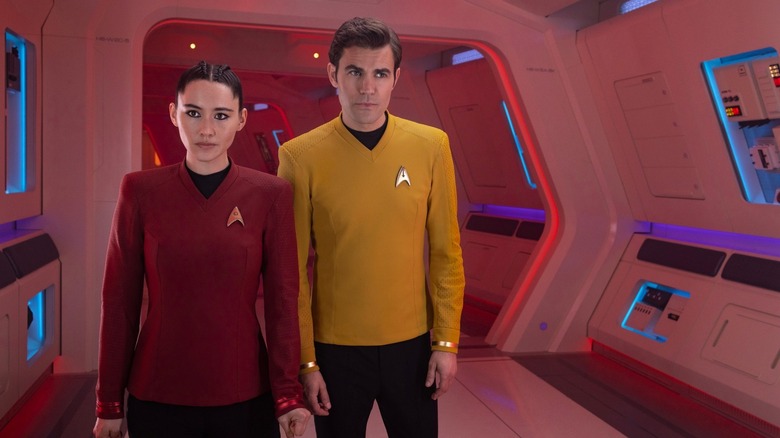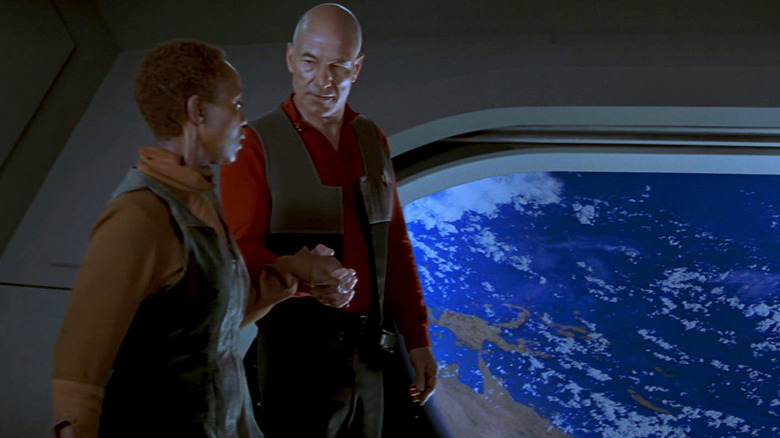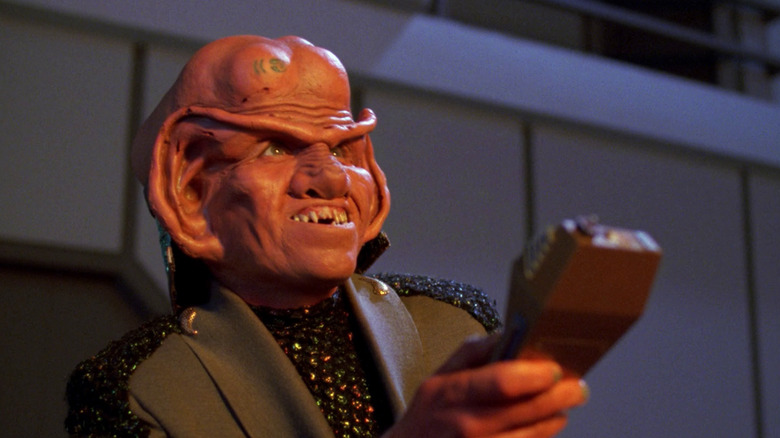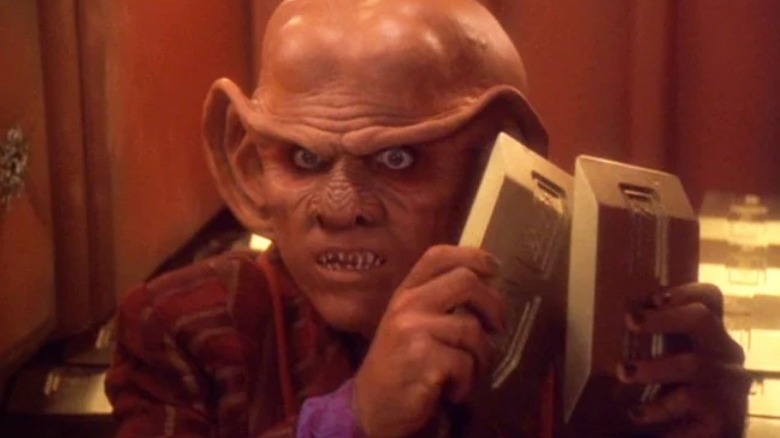Star Trek: Strange New Worlds Season 2 Reminds Us That Trek Is All About That Sci-Fi Socialism
This post contains spoilers for episode 3 of "Star Trek: Strange New Worlds" season 2.
The latest episode of "Star Trek: Strange New Worlds," called "Tomorrow and Tomorrow and Tomorrow," sees Lieutenant La'an Noonien-Singh (Christina Chong) and a parallel universe version of Captain James T. Kirk (Paul Wesley) thrown back in time to Earth in the early 21st century. Specifically, they end up in Toronto in 2023. The time travel widget they used to get there, however, is damaged, and the two must use what they can acquire in 2023 to repair it. They will also have to find period-appropriate clothing, as their Starfleet uniforms would most assuredly stand out.
Most bafflingly, both La'an and Kirk will need money, something neither of them has much experience with. Luckily, chess hasn't changed at all in the last several centuries, and Kirk knows how to hustle other chess players in a local park. They're able to get just enough cash to buy the food and clothing they need to sustain themselves on their mission. Once those things are acquired, however, money becomes a distant concern. The scenes of Kirk scrounging up a few dollars may remind some viewers of the scene in "Star Trek IV: The Voyage Home" where Kirk (William Shatner) has to sell an antique pair of reading glasses in a 20th-century pawn shop. When the shop owner makes a deal of $100, Kirk grins cluelessly and asks "Is that a lot?"
As most Trekkies will be able to tell you, "Star Trek" takes place in a post-capitalist society. The officers on a starship don't work for a paycheck, but to contribute to noble missions of exploration and scientific discovery. Resources are properly allocated in the future. There is no want, as the Federation takes care of all its citizens. "Trek" is essentially socialism to the point of utopia.
We work to better ourselves
In "Star Trek: First Contact," Picard (Patrick Stewart) explicitly states that "money doesn't exist in the 24th century" before adding: "The acquisition of wealth is no longer the driving force in our lives. We work to better ourselves and the rest of humanity."
It seems that, in the future of "Star Trek," all dreams are possible. If you wish to be a beekeeper, then surely there are planets where beekeeping would be beneficial to the local ecology, and the land — and anything you might need to build a home — would be given to you for free. If you want to open a restaurant, surely there's a storefront somewhere on one of the Federation's hundreds of worlds that can be filled. If you live in a country that is running low on water, Starfleet can replicate some, transport some from a world that has plenty to spare, or research why a drought is taking place and use climate adjusters to address the problem.
In short, the state — aka the Federation — takes care of just about everything in the future. And the people who work for the state/Federation do so happily because they know their work is for the benefit of everyone. Without money in the mix, there are no corrupt politicians to embezzle anything, and no one is being financially exploited. Indeed, it's been so long since money was a part of Earth's economy, that characters like La'an and Kirk are a little unfamiliar with the concept. They have to remember details from their history textbooks to understand what this "money" stuff was all about.
This is in keeping with "Trek" creator Gene Roddenberry's personal ethos; he was, according to his last wife, a Communist, and he often spoke out against the evils of capitalism.
But what about the Ferengi?
When it comes to humanity's natural inclinations toward ambition, "Star Trek" has that covered, too. In Starfleet, one can achieve promotions through a display of intelligent command decisions and weathering massive difficulties. Proving yourself capable provides a reward of prestige. Through many years of hard work, one may reach the rank of Admiral and oversee the missions of others from a cushy office on a starbase somewhere. It's been said before in the pages of /Film that prestige is the currency of the future, and constant, impressive contribution to the betterment of others is the only way to acquire it.
This is why "Star Trek" often sees so many corrupt admirals. Without serving on a starship and constantly contributing to missions — without earning prestige points — admirals get antsy and try to improve Starfleet through unwise militarization or automation.
Of course, while the Federation may not have money, they regularly do business with multiple worlds that still do. One might immediately think of the Ferengi, a species that not only operates by capitalism but whose entire society is based on increasing personal wealth. Even the central Ferengi religion is devoted to wealth, as one must buy their way into heaven. Their bible is a list of aphorisms called the Rules of Acquisition.
"Star Trek: Deep Space Nine" takes place on a space station that operates on capitalism and features multiple Ferengi characters. It's never explicitly stated, but one might naturally assume that Starfleet allocates actual money to its officers in such a place. On DS9, officers will indeed have to buy their food and entertainment, and I assume Starfleet won't force them to have a side-hustle to make the scratch. The Federation, then, does have a pro-capitalist exception.
Things that have value
It seems, however, that Starfleet officers are issued a type of virtual currency that can, via an extra step, be exchanged for actual, hard currency. The preferred mode of payment on Deep Space Nine is a substance called gold-pressed latinum. It comes in three denominations: slips, strips, and bars. The gold part of the currency is actually worthless to most species as gold is a common, soft, plentiful element in the world of "Star Trek." Inside the gold, however, is a tiny reservoir of difficult-to-find liquid metal called latinum. It's the gold housing paired with the liquid itself that has value. Although the liquid can be extracted and traded by itself.
Of course, while "Star Trek" may not have direct currency exchange among its Starfleet officers, many do know how to barter. Often medical supplies or technology will be exchanged for a service or a delivery. In one episode, Riker (Jonathan Frakes) offers half a gram of biometric gel to a trader. In another, Worf (Michael Dorn) offers older computer tech to some Romulans. Certain substances are still rare and valuable to the Federation. Dilithium crystals, for instance — a mineral required in starship engines — need to be carefully mined and are a limited resource. In order to get it, exchanges often need to be carefully negotiated.
Money and personal wealth may be gone in the future, but that doesn't mean Federation citizens don't have objects ... and concepts ... that they value and aim to acquire. So long as it's for the betterment of the galaxy, it's worth pursuing.



